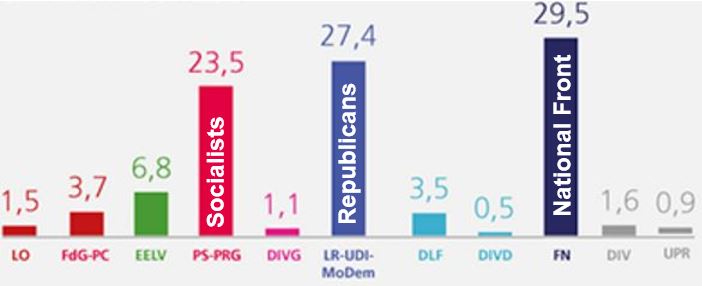Latest exit polls indicate that France’s ultra-right wing Front National has been beaten into third place. It appears the Front National has not won a single region, even though it led in six of the 13 regions in the first round of votes last Sunday.
Fears that the far right National Front Party could come out top has pushed up the turnout dramatically, according to local news sources. Turnout this time round is reported to be about 7% higher than it was in 2010, with 50.4% of eligible voters casting their ballots by 5pm. Polls close in large cities at 8pm.
Just 43.4% of eligible voters cast their ballots in the regional elections second round in 2010.
Canvassing has been intense since the first round vote, as candidates desperately try to get the almost 50% who did not vote on December 6th to do so today, saying that every single ballot cast could be crucial.
Canvassing, in this context, means going door-to-door during an election campaign.
 Marine Le Pen, President of Front National (English: National Front). Turnout is dramatically higher this time round as voters and the major parties fear a Front National victory. (Image: twitter.com)
Marine Le Pen, President of Front National (English: National Front). Turnout is dramatically higher this time round as voters and the major parties fear a Front National victory. (Image: twitter.com)
Le Front National (National Front Party in France) is an ultra-conservative political party whose major policies include opposition to immigration, zero tolerance regarding law and order issues, economic protections, and leaving the European Union. While political experts say the party is on the right to far-right, party members disagree.
The National Front has accused voters of ‘intellectual terrorism’, i.e. tactical voting to block its path to power. For example, if you support Party A, but know it has no chance of winning, you decide to vote for Party B because it is the only one with a chance to stop Party C from winning.
‘Intellectual Terrorism’ can also refer to parties. For example, Party A withdraws its candidate in order to help Party B win, thus undermining Party C’s chances.
National Front links immigration to terrorism risk
The Front National has been focusing on the perceived link between what it describes as rampant immigration to terrorist attacks, including the one in Paris on November 13th when 130 people were murdered.
On last Sunday’s first round, the Front National (FN) won six of thirteen regions. However, the governing Socialist Party has pulled out its candidates from two key regions and asked its supporters to back the Republican candidate. The Republican Party is a centre-right leaning party led by Nicolas Sarkozy.
 The last national TNS-Sofres poll put the National Front ahead of the other two main parties. The above figures are percentages – in French, the decimal point is expressed as a ‘comma’. (Image: www.tns-sofres.com)
The last national TNS-Sofres poll put the National Front ahead of the other two main parties. The above figures are percentages – in French, the decimal point is expressed as a ‘comma’. (Image: www.tns-sofres.com)
This tactic could block the FN’s chances of winning. Marine Le Pen, FN President, who is trying to take the Nord-Pas-de-Calais-Picardia region, could find her party sandwiched out. Exit polls suggest this tactic has been successful.
Nord-Pas-de-Calais-Picardia includes the port of Calais, where nearly 5,000 migrants are sleeping rough as they attempt to get to the UK, where they will either disappear into the *black economy or claim asylum.
* The black economy, also known as the underground economy or informal sector, is part of the economy where all work and business dealings are done only with cash. No taxes are paid and incomes are never declared.
France is today split down the middle, with many voters from the left and right of the political spectrum seriously considering voting for FN.
The Daily Mail quoted Evelyne Risselin, a voter who lives in Ms. Le Pen’s home base Henin-Beaumont, as saying:
“For me, she is going to win. Maybe it will make all those politicians stop and think.”
According to a TNS-Sofres poll, the Republican’s Xavier Bertrand will beat Ms. Le Pen with 53% of the vote, to her 47%.
Video – French regional elections

